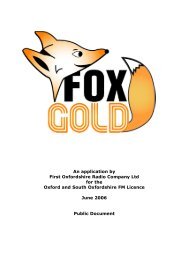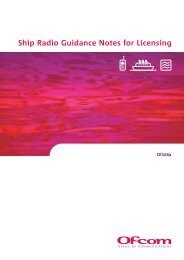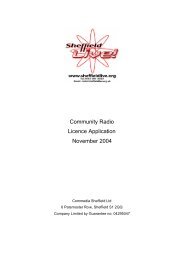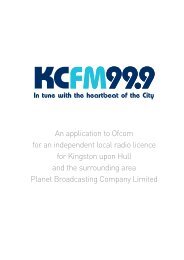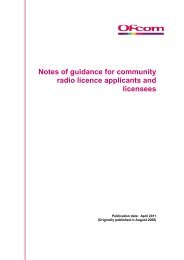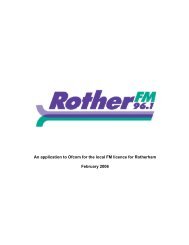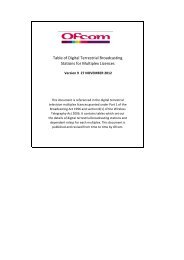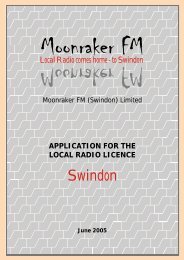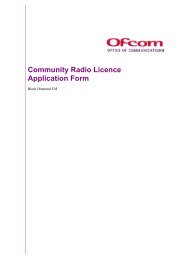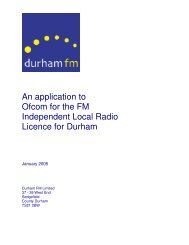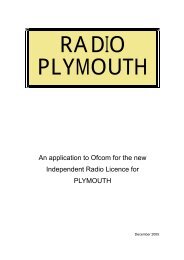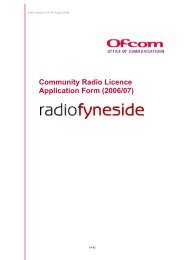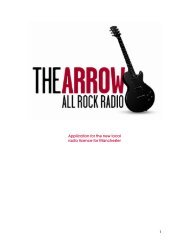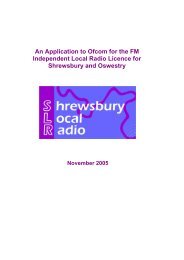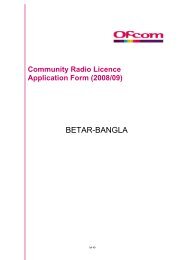Community radio licence application form TD1 ... - Ofcom Licensing
Community radio licence application form TD1 ... - Ofcom Licensing
Community radio licence application form TD1 ... - Ofcom Licensing
You also want an ePaper? Increase the reach of your titles
YUMPU automatically turns print PDFs into web optimized ePapers that Google loves.
Programmes and programme output:<br />
Definitions:<br />
<strong>TD1</strong> Radio <strong>application</strong> <strong>form</strong><br />
Studio location: The studio from which the service will be broadcast should be located within the licensed area.<br />
(In some instances, and by prior written agreement from <strong>Ofcom</strong>, it may be acceptable for the primary studio to be<br />
located outside the licensed area.)<br />
Locally-produced: it is anticipated that most stations will produce the bulk of their output themselves, in the<br />
locality. However, for some target communities it may be appropriate for fairly high levels of output to originate<br />
from outside the licensed area.<br />
Live output: is that which is produced by a presenter in the studio at the time of broadcast. The amount of live<br />
output may vary between different services depending on the needs or expectations of the target community.<br />
Peak time: it may be helpful to state what material will be broadcast in ‘peak time’. If you do, please say what<br />
you consider peak time to be for your target community (this may vary from station to station).<br />
Automated output/voice-tracked material: most stations will carry automated output at some time. The amount of<br />
automated or voice-tracked material does not need to be specified in the key commitments.<br />
Sustaining service/third party produced material: if you intend to broadcast material produced by a different<br />
organisation please state what it is and how much (per day or week as appropriate).<br />
4. Programming output Guidance Notes<br />
Please fill-in all three questions below<br />
Question A asks you to describe your programme<br />
service.<br />
Question B relates to how your output will serve the<br />
tastes and interests of your target community.<br />
Question C is about how your service will broaden<br />
the range of local (non-BBC) services available in<br />
your area.<br />
Later in this <strong>form</strong> you will be asked to draft your own<br />
„key commitments‟. This will <strong>form</strong> the basis of your<br />
<strong>licence</strong> and is what <strong>Ofcom</strong> will judge you against. It<br />
should include a summary of your proposed<br />
programme output as set out below and reflect your<br />
commitment to cater for relevant tastes and interests,<br />
to broaden the range of relevant programmes and<br />
services and to provide a service with a distinct<br />
nature and content as set out in the Guidance Notes<br />
in the column opposite.<br />
4. Programming output<br />
The law requires applicants to state their proposals for<br />
providing a service that would:<br />
(i) cater for the tastes and interests of members of its<br />
target community or communities (or for any<br />
particular tastes and interests in those communities);<br />
(ii) broaden the range of programmes available on non-<br />
BBC local services (commercial and community<br />
stations) to members of the relevant community or<br />
communities;<br />
(iii) broaden the overall range of such non-BBC local<br />
services provided in the area concerned; and<br />
(iv) have a distinct nature, or provide distinct content,<br />
from any non-BBC local services with which it would<br />
overlap.<br />
<strong>Ofcom</strong> is required to consider the extent to which an<br />
applicant’s proposals will cater for the tastes and<br />
interests of members of its target community or<br />
communities.<br />
<strong>Ofcom</strong> is also required to consider the extent to which<br />
proposals for a community <strong>radio</strong> station would broaden<br />
the range of programmes available by way of non-BBC<br />
local services (both commercial and community stations)<br />
in the area concerned (especially, the extent to which a<br />
proposed service would have a distinct nature or provide<br />
distinct content from any overlapping non-BBC local<br />
services).<br />
The in<strong>form</strong>ation given here should be more detailed than<br />
what you set out in your draft key commitments (later in<br />
this <strong>form</strong>), and will help us gain a fuller understanding of<br />
how you will serve your target community and what the<br />
station will sound like.<br />
A: Please tell us about your programme service The following questions may help you describe your<br />
programme service (but should only be used as a guide):<br />
What will the service sound like?<br />
What music will you play?<br />
What are the main speech elements of the service and how will the social gain/community benefits you<br />
2



